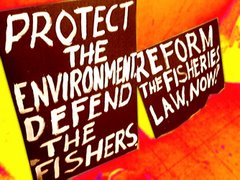
http://bulatlat.com/main/2008/10/25/int’l-mission-off-shore-mining-violates-fisherfolk’s-right-to-food-and-livelihood/
Int’l Mission: Off-shore Mining Violates Fisherfolk’s Right to Food and Livelihood
PUBLISHED ON OCTOBER 25, 2008 AT 5:41 PM SHARETHIS | PRINT THIS
RELATED STORIES
Elders in Benguet Town Reject Mining Exploration
Green Group Blames Large-Scale Mining for Landslide in Compostela Valley
400,000 Central Visayas Fisherfolk Affected by Oil Exploration
Environmentalists Increasingly Anxious Over Effects of Mining in Davao Gulf
Golden Lessons of Lubo
An international fact-finding body, which recently visited communities affected by the off-shore oil and gas exploration along the Cebu-Bohol strait, revealed that the exploration would be detrimental to the livelihood of the fisherfolks in the area.
BY RITCHE T. SALGADO
Contributor
Bulatlat
An international fact-finding body, which recently visited communities affected by the offshore oil and gas exploration along the Cebu-Bohol strait, revealed that the exploration would be detrimental to the livelihood of the fisherfolks in the area.
The offshore mining exploration is being undertaken by the Department of Energy (DoE) and Australian company, NorAsian Energy Ltd.
Vince Cinches, executive director of the Central Visayas Fisherfolk Development Center, Inc. (FIDEC) and a delegate of the International Fact-Finding Mission sponsored by the Pesticide Action Network Asia and the Pacific (PAN AP), revealed that in all the communities they visited in Pinamungajan, Aloguinsan, Argao and Sibonga, there has been a 70 to 80 percent reduction in fish catch. Because of the reduction in income, children of many fisherfolks have stopped schooling, while others are getting sick because of malnutrition.
Other delegates of the IFFM are Andry Wijaya of Jatam-Indonesia and the Oil Watch Southeast Asia; Teh Chun Hong of PAN AP; Wichoksak Ronnarongpairee and Busarin Pandit of the Federation of Southern Fisherfolk (Thailand); Gilbert Sape of the People’s Coalition on Food Sovereignty (PCFS); and, Meggie Nolasco of Kalikasan-People’s Network for the Environment (Philippines).
Cinches, who is also co-convenor of the environmental group Save Tañon Strait Citizens’ Movement (STSCM) pointed out that the Visayas is the epicenter of global marine shorefish diversity with the “richest concentration of marine life in the entire planet.”
He said that the presence of NorAsian or JAPEX, is detrimental to the marine biodiversity in the area as the sonic boom from the air gun used in the seismic survey would result in damage to the body tissues of marine organisms, including their reproductive systems.
In addition, the noise that would be made could alter the distribution of fish by tens of kilometers.
“You should keep the oil underground and let fisherfolks have their means of livelihood,” said Andry Wijaya of Jatam-Indonesia and Oil Watch Southeast Asia (Indonesia).
Atty. Gloria Estenzo-Ramos of STSCM asserted that drilling is a violation of the concept of social justice as provided for by the constitution. She added that the fisherfolks should have the supreme right to the use of fishing grounds.
Cinches said that because of strong opposition from different local governments in Bohol and the affected communities, NorAsian was forced to transfer their base of operations in Cebu by mid 2007. He said that Cebuanos should not permit what the Boholanos have rejected.
Paulita Destor of Bol-anong Kahugpungan sa mga Kabus nga Mananagat (Bokkana-Bohol) said that the exploration along the Cebu-Bohol Strait should be stopped as this would destroy the rich marine resources of the strait. This in turn would further bring the fisherfolks deeper into poverty.
Representatives from oil-producing countries Malaysia and Indonesia claimed that the presence of oil producing companies would not help in the country’s economy.
“Malaysia is a petroleum exporting country,” said Teh Chung Hong of Malaysia-based PAN-AP. “Forty percent of our income is from petroleum. But despite this our country still imposed a forty percent increase in the price of oil. Malaysia’s experience is that petroleum money will not bring benefit to people, even for oil-producing countries,” he said.
He further cited the example of Sarawak and Teranganu, which produces most of Malaysia’s oil. He said that these two states are also Malaysia’s poorest.
In response, Antonio E. Labios, regional director of the Department of Energy (DoE) Visayas Field Office, said that the claims of the fisherfolks regarding the reduction in fish catch is yet to be validated and substantiated by scientific studies.
Cinches said that Cebuanos should not wait for scientific studies to be made for this claim to be substantiated as the experience of the fisherfolks is enough evidence to prove the ill-effects of the survey.
Labios said that 12 of the 14 barangays of Argao have passed resolutions endorsing the project and that meetings with the mayors of Argao and Sibonga, as well as that of the governor have shown that they are supportive with the project. “We just have to address the issues of the fisherfolks,” he said.
However, the four-day IFFM further discovered that the communities as well as local government officials were not consulted by the mining companies before entering the seas, in violation of several Philippine laws. It was also disturbed by reports that some local government officials are involved in unethical relations with the mining companies and that the military has been deployed in certain areas to intimidate and quell the growing citizens’ movement against off-shore mining.
Labios further claimed that based on their consultation with the Environmental Management Bureau (EMB) of the Department of Environment and Natural Resources (DENR), an Environmental Compliance Certificate (ECC) is not required for NorAsian to conduct the survey as said document is only needed once production is started.
Regardless, NorAsian and JAPEX did their best to comply with environmental guidelines, which includes consultation with various stakeholders, claimed Labios.
Labios said that they would soon be signing a Memorandum of Agreement (MOA) with the Municipalities of Argao and Sibonga so as to lift the recent cease and desist order imposed by the provincial government of Cebu as per Executive Order No. 09 signed by Governor Gwendolyn Garcia.
Labios said that the purpose of the seismic survey is to minimize if not eliminate the environmental impact once the oil drilling is started.
“The DoE and the service contractor do not shy away in addressing the concern of the fisherfolk,” Labios said.
“It is disturbing to know that the Philippine government is hell-bent on pursuing these so-called energy development projects despite the overwhelming opposition of citizens, especially the poor fisherfolk who are the most affected. We have seen in Asia and many parts of the globe that at the end of the day, these would only benefit the companies and corrupt government officials. History shows that oil doesn’t translate to wealth of the people,” said Sape of the People’s Coalition on Food Sovereignty (PCFS). (Bulatlat.com)





No comments:
Post a Comment